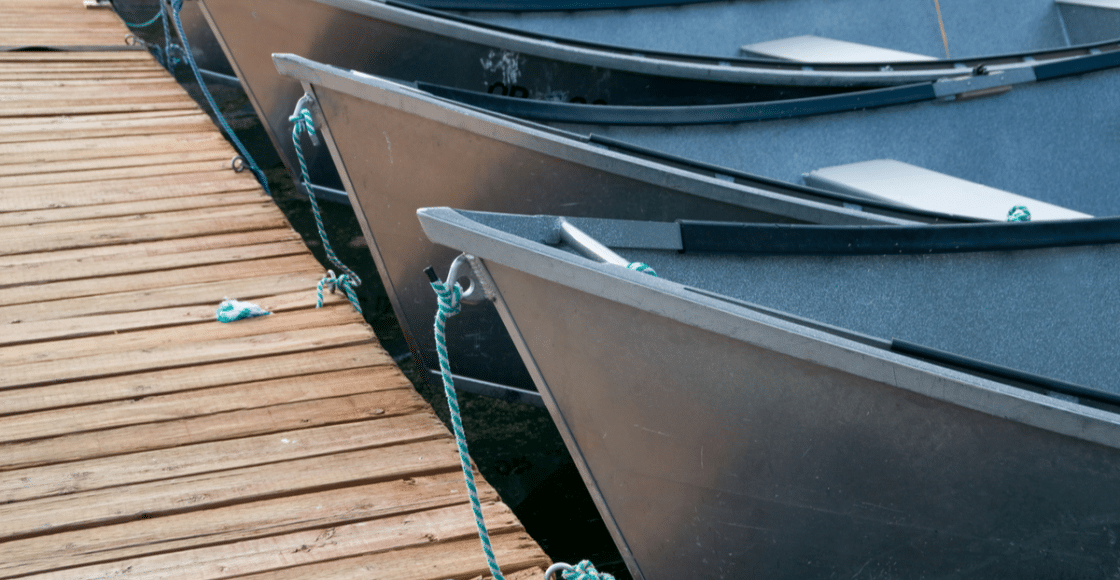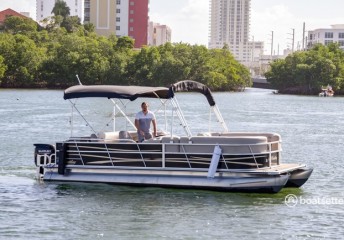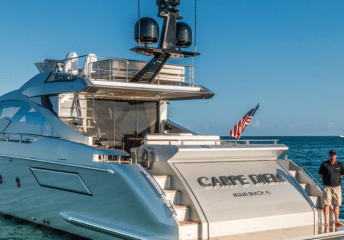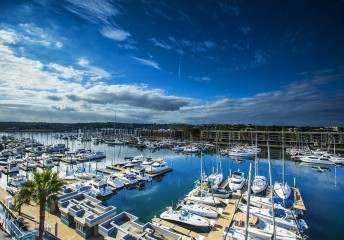Aluminum vs Fiberglass Boats
Last Updated on May 20, 2022 by Boatsetter Team
Buying a boat can be very intimidating, even for the most seasoned captain. When purchasing or renting a boat, there are many things to consider, like your budget, where you’ll be taking the boat, and what you plan on using it for.
Choosing a boat is like buying a car; you need to get something that suits you, your lifestyle, and the intended purpose. It doesn’t make sense to purchase a yacht or sailboat if you plan to use your boat for fishing or water skiing. Even when you’ve figured out the kind of boat you need for its intended purpose, you’re eventually going to have to decide on whether you want to go with fiberglass or aluminum.
The differences between fiberglass and aluminum boats range from weight to maneuverability to damage control, with a true showdown of pros and cons on either end. Hopefully, this guide to aluminum vs fiberglass boats can give you some insight into the differences between the two.
Aluminum Boats
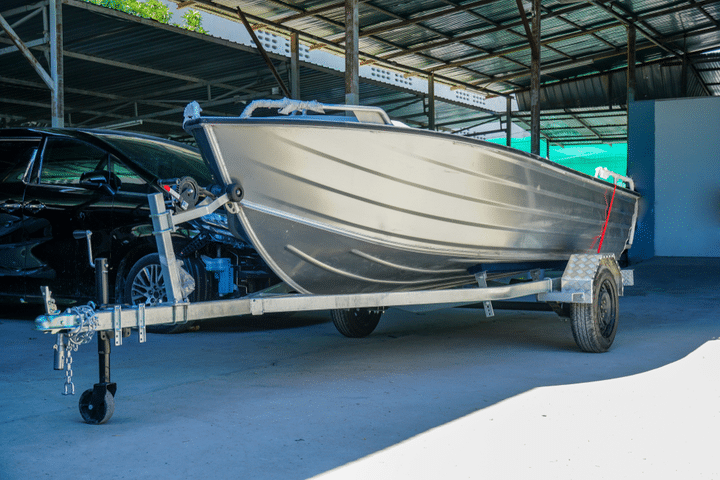
When it comes to buying a boat for fishing, aluminum boats are usually close to the top of the list. If you’re looking for something to get you out on a lake for a day of trout fishing, this may be your best bet, but if you’re looking for a little more in a boat as far as comfort, handling and stability goes, you may want something heavier. Sometimes renting a boat to see how you like it can be very helpful in your decision-making process.
Advantages of Aluminum Boats
Aluminum boats are much lighter than fiberglass, making them easier to launch and unload from your trailer.
The lightweight also makes the boat easier to tow; a smaller vehicle can usually tow a lightweight aluminum fishing boat.
In general, aluminum boats are less expensive than their fiberglass counterparts, making them affordable for even the most unenthusiastic hobbyist.
Also, aluminum boats are less costly when making repairs and less in overall operating costs due to their lightweight.
In the unfortunate event of an accident, aluminum boats will dent rather than crack, making repairs less costly for the boat owner.
Aluminum boats will generally have a long lifespan due to their toughness and durability, making them a worthwhile long-term investment.
Disadvantages of aluminum boats.
Lighter-weight boats tend to be less stable in windy or choppy water conditions and don’t handle as smoothly at higher speeds. The lighter weight also means that aluminum boats will tend to drift further in windy conditions.
Customizing your aluminum boat can be difficult because aluminum is not as malleable as its fiberglass counterparts. You can make some custom changes to the interior, but the exterior cannot be customized.
Aluminum boats work well for fishing and touring, but not so much for water skiing, so if you’re looking for something for both, this may not be your best choice.
Aluminum boats can be very noisy, especially if the boat is going fast and causing water to splash up against the hull. Additionally, having a conversation with someone while traveling at even a moderate speed can be challenging.
Aluminum boats, like anything metallic, are subject to corrosion. Even though aluminum boats are claimed to be corrosion-proof, this can still be an expensive problem if you don’t take care of your boat correctly.
Fiberglass Boats
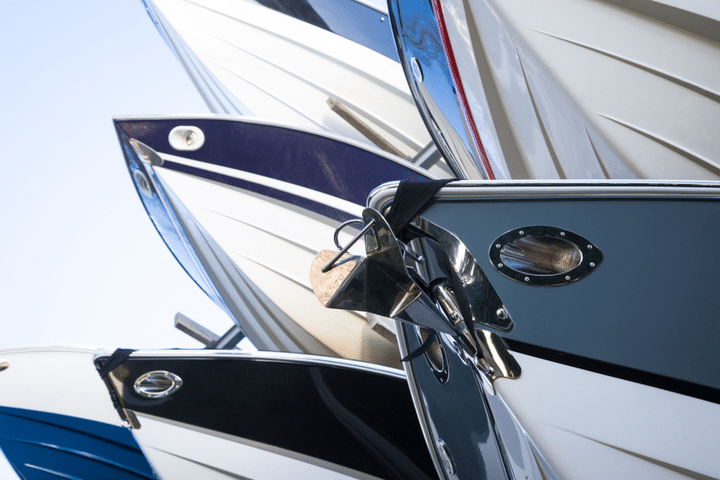
Fiberglass boats have a lot to offer, especially if you’re looking for a fishing, touring, or sport boat. If you’re in the market for a smooth, comfortable ride in a flashy little fishing boat, then this may be your ticket. Fiberglass boats have been around for a long time leading to plenty of opportunities for fine-tuning and a solid reputation.
Fiberglass fishing boats are designed for comfort and performance, giving you a smoother, more comfortable ride even in challenging conditions. You can expect more control and maneuverability if you’re thinking of using a fiberglass boat. As with aluminum boats, renting a fiberglass boat for a day or two may help solidify your decision.
Advantages of Fiberglass Boats
Fiberglass is one of those materials that are pretty malleable, creating opportunities for a custom design. With both interior and customizable exterior options, your fiberglass boat can become your custom craft.
Fiberglass boats are heavier than aluminum boats giving them more stability in choppy or windy conditions.
Fiberglass boats generally have a smooth, clean look, so this may be a better choice if aesthetics are important to you.
Due to the heavier weight, fiberglass boats will give you a much smoother ride and easier manageability, especially at high speeds or when it’s windy. The heavier weight also means the boat will drift at a slower pace than aluminum boats.
Fiberglass boats work well for fishing and sports like water skiing, so if you’re looking for something for dual purposes, a fiberglass boat should be a strong consideration.
Disadvantages of Fiberglass Boats
Fiberglass boats are considerably more expensive than aluminum boats and will cost more if repairs need to be made. The upkeep of fiberglass boats can also be expensive.
Also, if in an accident, fiberglass will crack or create a hole instead of denting, requiring more extensive repairs, leading to a higher repair cost.
Fiberglass boats also cost more to operate since heavier boats require more power to move on the water.
The heavier weight also requires more human power to launch and more vehicle power to tow. Your vehicle will need to be able to manage a lot of weight on the trailer.
Comparing Aluminum VS Fiberglass Boats
Price: Purchasing a new aluminum boat will cost considerably less than buying a fiberglass boat, so aluminum may be your best option if budget is a concern.
Damage Control: In the unfortunate event of an accident, an aluminum boat will dent, whereas a fiberglass boat will crack or create a hole.
Speed: While both boats can reach impressive speeds, aluminum boats require less power due to the lighter weight.
Comfort: If you’re looking for a smooth, comfortable ride, fiberglass boats take the cake on this one.
Repairs: Aluminum boats are less expensive to repair, whether it’s a functional problem or repairing damage to the boat.
Handling: Fiberglass boats not only give you a more comfortable ride, but they are also easier and smoother to operate on the water.
Durability: Aluminum boats can withstand a beating, and dents can easily be hammered out, not so much for fiberglass boats. If your fiberglass boat gets a crack or hole, the repairs may put your boat out of commission for a while.
Noise: Fiberglass boats are the winner in this one, especially if you’re out fishing. Dropping something or accidentally hitting your rod up against the side of the boat will most certainly spook any fish in the area.
Safety: Aluminum boats are the leader on this one. They are very strong, and the possibility of a fire breaking out is virtually impossible.
Aesthetics: Fiberglass boats are far more pleasing to the eye. Their sleek design and customizable options make them a great boat for touring or parties. From color to design, you’ll have many more options with a fiberglass boat.
Environment: If the environment is a concern for you, then aluminum is the best choice. Fiberglass boats are constructed from composite materials made from resins that can be harmful to the environment. Additionally, trying to recycle a fiberglass boat is very complicated, if not impossible.
Reputation: Aluminum boats have carried a reputation of being cheaply made and of lesser quality than fiberglass boats. While aluminum boats are known to be durable and efficient, their long-standing reputation may ultimately lower the resale value if you plan to sell them down the road.
Geographical Considerations: One of the most important considerations when choosing a boat is where you plan on taking it. While it seems like any boat will do when talking to a lake, it’s important to think about where you’ll be spending most of your time.
An aluminum boat will serve you well if you plan to spend the day fishing close to the rocky shoreline. These boats make a perfect choice with easy launching capabilities due to the lightweight and durable aluminum hull to withstand a collision with rocks.
If taking a cruise on the open waters with your friends and family is more your style, you may want to go fiberglass. These comfortable and stylish boats will give you a smooth ride while turning heads.
Final Note
Figuring out exactly what the main purpose for your boat is and where you’ll likely be taking it, are the primary factors when choosing a boat. Once that part is figured out, this aluminum vs fiberglass boat guide should help you fine-tune your decision.
Understanding the difference between aluminum and fiberglass boats is key to making the best decision, whether you’re just cruising or celebrating a bachelor party. Both types of boats offer value in different areas, so it ultimately depends on the individual needs of the boat owner. Regardless of which you choose, there’s nothing better than taking to the water in a craft that suits your personality and lifestyle!

Boatsetter empowers people to explore with confidence by showing them a world of possibility on the water. Rent a boat, list your boat, or become a Boatsetter captain today.
